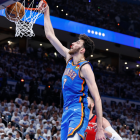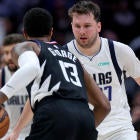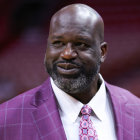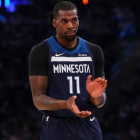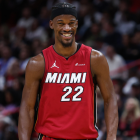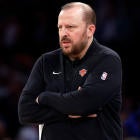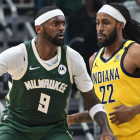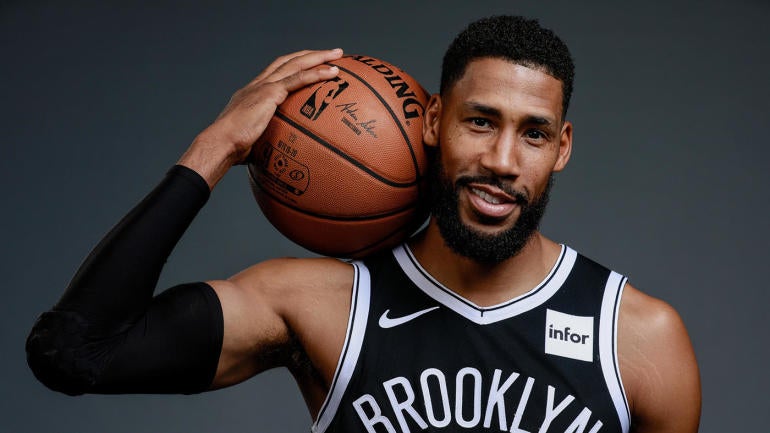
NEW YORK -- Michele Roberts saw Garrett Temple on television and panicked. Typically, the executive director of the National Basketball Players Association likes to speak with players before they do interviews on national TV to make sure they are comfortable with the subject matter. She didn't know Temple that well yet, and she was not expecting him to pop up on "Outside The Lines" with Bob Ley. Roberts put aside the work she was doing, turned up the volume and, as Temple spoke, her fear subsided.
At the end of the segment, Roberts texted him: "I love you."
Temple appeared on the show multiple times, talking comfortably about subjects like police brutality and mental health. "If we here at the PA could create the prototype member, it would be him," Roberts said. When Temple played for the Washington Wizards, a rookie Bradley Beal ate with him every day, got shots up with him and counted on him as his best friend.
"I always tell everybody he's the best teammate I've ever had," Beal said. "For sure. Everything he stood for, and just the way he carried himself -- I don't want to gas him up, but just the way he carried himself was perfect. I almost wanted to mimic that in a way and carry myself the same way."
Ever meet someone who is so successful and smart that they would be intimidating if they weren't so maddeningly nice? Temple is like that, plus he's a guard for the Brooklyn Nets and he's dating a scientist with a Miss USA crown. "Garrett is perfect," Roberts said, and Beal called him a "humble, God-fearing, perfect guy you want to be around."
Sickening, isn't it?
Beal said Temple, a member of the NBPA's executive committee, didn't even have to talk to him about becoming the Wizards' union rep, but is the reason why he did it. When Chris Paul steps down as union president, Beal expects that Temple will "definitely" be next in line. Nets wing Joe Harris said that his teammate is easily qualified to run … for President of the United States.
"I guess you have to be 35 years old, right?" Harris said, noting that Temple is 33. "A couple years, if he wants to retire, get into politics. That's Garrett Temple, right there."
Everybody, veterans included, listens when Temple speaks, but he has "an unbelievable influence on young players," Harris said. Dzanan Musa, a 20-year-old guard who appreciates Temple's advice about breaking into the rotation, overheard.
"First of all," Musa said, "Garrett, as Joe said, can run for President right now."
After Langston Galloway, a fellow native of Baton Rouge, Louisiana, went undrafted, Temple explained to him why he'd be better off going to the G League than overseas. When Beal had bad days, Temple told him to keep going; no matter how tough it gets, you control how happy you are. Justin Jackson, who spent his rookie season with Temple in Sacramento, recalled him telling the young Kings how tough it can be to earn a roster spot and then find your niche in the league.
Roberts called Temple an ambassador for the NBPA because he has participated in essentially all of their programs and tells young players how the union can help them. He wants them to take their mental health seriously, be smart with their money and set themselves up to slide into a second career when the ball stops bouncing. He speaks up at financial literacy meetings, and he talks to prospects on the subject at the draft combine. After Brooklyn wing Caris LeVert signed his rookie contract extension, they discussed real estate and the pros and cons of renting vs. buying. If you are on his team, you will be told that he is available if you have any questions. If you are close to him, he will start the conversations himself.
"If they don't know, I owe it to them," Temple said.
If the league or the union were to commission a guide to the NBA, Temple would be the ideal author. He already knows what the five chapters would be: Stress, finances, relationships, professionalism and understanding your game. He is known as a solid, reliable role player now, but he spent a year in Italy, signed nine 10-day contracts and suited up for six NBA teams and three G League teams before he started a season on a fully guaranteed deal.
Beal remembers Temple clapping on the bench, cheering his teammates on and putting in his work even when he wasn't in the Wizards' rotation. He remembers Temple's outreach in the community, too. They would talk about basketball, business and their struggles "being able to say no to family and friends," Temple said. When he thinks about how Beal -- a "quiet, mature-beyond-his-years" rookie -- has grown on and off the court since an unexpected series of events landed Temple in D.C., he gets chills.
"You're in the places where you're supposed to be," Temple said.
On Dec. 15, 2012, Temple logged 50 minutes for the Reno Bighorns in a double-overtime game against the team then known as the Los Angeles D-Fenders. The next day, at LAX, he got a call from Tommy Sheppard, then the assistant general manager of the Wizards. As he gave his boarding pass to the gate agent, Sheppard asked if he could fly to D.C. instead for a workout.
Temple wound up getting on the plane to Reno, then flying back to L.A. in the afternoon and to D.C. on a red-eye. Temple and Chris Quinn, a friend -- and his replacement with the Spurs when they cut him two years prior -- were told that the team would sign one of them. The workout, run by coach Randy Wittman, involved a lot of running and one on-one.
"It got to a point where we were tired," Temple said. "It was really sloppy." There were shooting drills, too, but Temple got the sense that it was about seeing whether or not they would break down. Neither did. At the end, Wittman told both of them that the team would stand pat.
This was Temple's fourth year out of LSU. Two months earlier, he thought he had done everything he could in training camp to make the Miami Heat's roster. "I'm usually a guy that really lets stuff roll off his shoulders," he said, but the D.C. disappointment was different. He rejoined the Bighorns for two games in Texas, but he was in his own head, "frustrated about the whole situation, admittedly." After a rough game on Dec. 21, he went home to Baton Rouge, Louisiana, to see his family, rest and clear his head.
Sheppard called again on Dec. 23. Washington wanted to sign him to a non-guaranteed deal. It seemed like a Christmas miracle, but Temple had a choice to make.
When the Heat had waived him, they had asked for a courtesy call if another team made him an offer. Temple's agent made the call, and Temple soon found himself talking to Miami coach Erik Spoelstra. Temple wouldn't play unless there was an injury, Spoelstra told him, but were he to get cut again, it would look better if the defending-champion Heat rather than the 3-22 Wizards were the ones doing the cutting. Temple chose Washington.
"Besides the fact that I told Tommy and Ernie (Grunfeld) that I was going to come, I also wanted to bet on myself," Temple said. "It surprised Spo. And still to this day, every time he sees me, he says you made the right decision, you bet on yourself."
There is no magic to bouncing back, according to Temple. Every time a team let him go, he told himself he simply wasn't supposed to be in the NBA yet. For support he talked to his father, Collis Temple Jr., and he prayed. Collis was first black player to play for LSU, and he had a stint in the ABA with the Spurs. Later, he and Garrett's mother, Soundra Johnson Temple, opened group homes, a detox center and a women's shelter in Baton Rouge. Talking to his family tends to calm Temple down.
Every player has his own challenges, and Temple pointed out that he didn't have the same financial burden as many of his peers. He could afford, literally, to stay positive and patient after going undrafted.
"The motivation was never to get to the NBA to buy my mom a house or my dad a house or my grandma (a house) or get out of a bad situation financially," Temple said. "It was because I want to play."
Unlike most journeymen, Temple "never had a chip on my shoulder because I was doubted," he said. He persevered, sure, but it wasn't because he needed to prove people wrong. He just believed, especially after getting a taste of the NBA, that he could make it. Or at least he believed that more often than he didn't.
Temple recalled a recent conversation with Brooklyn's sports psychologist, Paul Groenewal, on the subject of self-doubt. "You're honestly not human if you don't have a little bit of uneasiness or doubt or nervousness," Temple said. The league is about handling it, not avoiding it. Even though he was a starting for the Wizards when his guarantee date approached six years ago, he worried that they would choose Shelvin Mack over him. Mack was coming off two strong games, and Temple had shot poorly in them.
One perk of bouncing around, though, is getting to meet lots of executives. Temple had nerves, but he knew a decision like that wouldn't be based on a two-game sample. He has taken the NBPA's leadership program, which is meant to prepare players for front-office jobs, four times. He has also taken the coaches program, and has received votes for the active player who will make the best coach in three straight GM surveys. Temple said fringe players should "have a mindset like Monte Morris," keeping their usage low and their efficiency high, and all players need to understand that, having a long career means accepting various roles.
"My ability to think like that really helped me," Temple said.
Temple, a self-described "chill guy," prefers Brooklyn to Manhattan. When he walks his dog, he sometimes stops at Brooklyn Bridge Park to watch pickup games. For all of his wisdom -- Beal called him "an all-around kind of guru-genius guy" -- perhaps his greatest trick is being able to come off as normal.
"He's dancing all the time when he's outside of basketball," Galloway said.
"He can be a straight clown," Beal said. "He's funny. He's country."
The truth is that Temple is not normal in any sense. He has just begun his 10th season in the NBA, his 11th as a professional, with a multitude of options when it comes to life after basketball.
"I don't want to suggest that he's unusual or extraordinary as compared to his peers, but frankly he is," Roberts said.
In comparison to superstars, though, his story is relatable. Since his last game with the Bighorns, he has played for five teams and has been traded twice. He has gone from an end-of-the-bench guy to a trusted, proven rotation player; from a tall point guard to a versatile, floor-spacing wing. He had to fight to convince teams he belonged in the league, which, in Roberts' view, makes the message he can send far more effective than anything LeBron James can tell a player drafted in the second round or called up from the G League.
"He had to prove it in ways that LeBron didn't," Roberts said. "And he continued to have to do that every year. And he's done it successfully, which explains why he's still here."
Galloway called Temple "inspirational." Jackson lamented that there "aren't many fans that can truly appreciate G-Temp like he should be appreciated." At Nets media day, he spoke to a small group of reporters at a table rather than a huge crowd at a podium. One prefaced a question by telling him that he is one of the most underrated players in the league.
Among insiders, though, Temple is known and valued. After he agreed to a deal with Brooklyn, he had a conversation with Kyrie Irving. Temple had defended Irving many times, but their relationship did not extend to coordinating their free-agent decisions. Irving wanted Temple to know that he respects his game, and that when the star point guard committed to the Nets, he gave management a list of targets he'd like them to pursue. Temple's name was on it.















